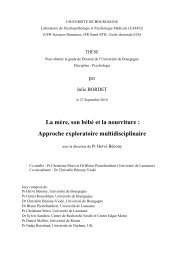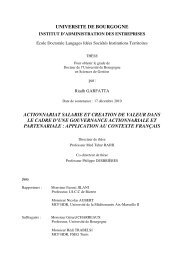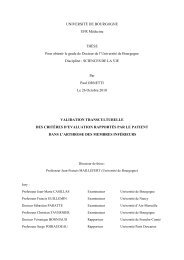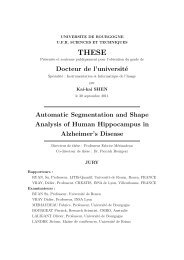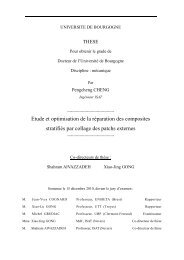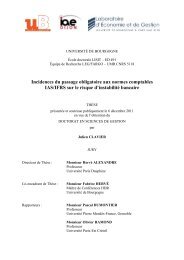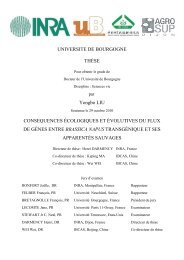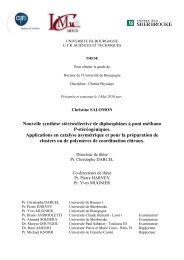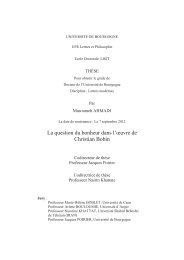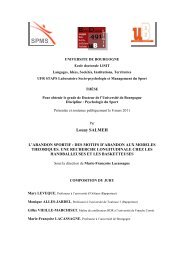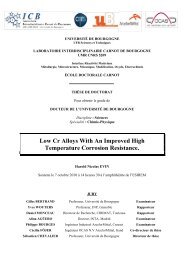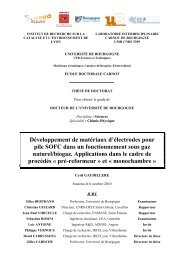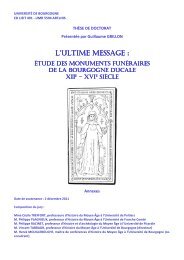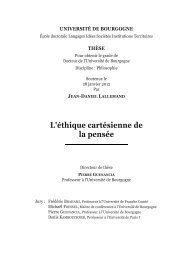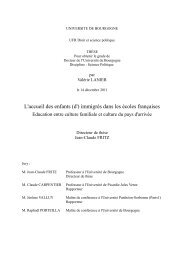Higher education in Asian countries and the role of international ...
Higher education in Asian countries and the role of international ...
Higher education in Asian countries and the role of international ...
You also want an ePaper? Increase the reach of your titles
YUMPU automatically turns print PDFs into web optimized ePapers that Google loves.
5.1 United Nations Educational, Scientific <strong>and</strong> Cultural Organization (UNESCO)<br />
92<br />
UNESCO, acronym for United Nations Educational, Scientific <strong>and</strong> Cultural Organization, is a<br />
specialized agency <strong>of</strong> <strong>the</strong> United Nations Organization (UNO), it was created <strong>in</strong> 1946 to promote<br />
<strong>in</strong>ternational collaboration <strong>in</strong> <strong>education</strong>, science, <strong>and</strong> culture. Its headquarters are <strong>in</strong> Paris,<br />
France. Ak<strong>in</strong> to her mo<strong>the</strong>r Organization UNO, UNESCO has been work<strong>in</strong>g to achieve one po<strong>in</strong>t<br />
agenda “freedom from fear”, a world free from all types <strong>of</strong> panics: fear <strong>of</strong> ignorance, fear <strong>of</strong><br />
scientific nescience, fear <strong>of</strong> social unawareness, fear <strong>of</strong> cultural <strong>in</strong>sensitivity <strong>and</strong> fear <strong>of</strong><br />
<strong>in</strong>formation bl<strong>in</strong>dness <strong>and</strong> half knowledge. Accord<strong>in</strong>g to UNESCO <strong>the</strong> ultimate outcomes <strong>of</strong> its<br />
actions will be a freedom from war <strong>and</strong> poverty (Bubtana, 2005).<br />
5.1.1 A glance at UNESCO<br />
20 th century is marked with <strong>the</strong> unprecedented developments on <strong>the</strong> global scenario. These<br />
developments brought major changes on <strong>in</strong>ternational level with far-reach<strong>in</strong>g consequences.<br />
Among <strong>the</strong>m is <strong>the</strong> emergence <strong>of</strong> <strong>in</strong>ternational organizations on global horizon with <strong>in</strong>ternational<br />
agenda, such type <strong>of</strong> developments have no precedence <strong>in</strong> human history.<br />
The history <strong>of</strong> <strong>the</strong> birth <strong>of</strong> UNESCO is based on <strong>the</strong> need to secure <strong>the</strong> future by foresee<strong>in</strong>g <strong>the</strong><br />
challenges <strong>and</strong> by plann<strong>in</strong>g for future dem<strong>and</strong>s <strong>in</strong> <strong>the</strong> present. Its history is not just that <strong>of</strong> an<br />
<strong>in</strong>stitution, but <strong>of</strong> a whole era which <strong>the</strong> Organization has reflected <strong>in</strong> its programs, declarations<br />
<strong>and</strong> resolutions_ <strong>in</strong> o<strong>the</strong>r words world history is woven <strong>in</strong>to <strong>the</strong> <strong>in</strong>stitutional life <strong>of</strong> UNESCO.<br />
(Federico Mayor, DG UNESCO 1995)<br />
5.1.1.1 Background<br />
UNESCO is <strong>the</strong> heir <strong>of</strong> International Institution <strong>of</strong> Intellectual Co-operation so it born long<br />
before it appeared on <strong>the</strong> world horizon. The League <strong>of</strong> Nations was formed at <strong>the</strong> end <strong>of</strong> <strong>the</strong><br />
First World War (1914-1918). The aim <strong>of</strong> this organization was to serve as permanent mach<strong>in</strong>ery<br />
for <strong>in</strong>ternational co-operation <strong>in</strong> political <strong>and</strong> o<strong>the</strong>r doma<strong>in</strong>s (Hajnal P. , 1983). In its very first<br />
session, The League <strong>of</strong> Nations, <strong>in</strong> November 1920 discussed <strong>the</strong> emerg<strong>in</strong>g needs to <strong>in</strong>stitute<br />
<strong>in</strong>tellectual co-operation (Valderrama, 1995). On 21 st September 1921 <strong>the</strong> Assembly <strong>of</strong> <strong>the</strong><br />
League <strong>of</strong> Nations adopted a resolution that resulted <strong>in</strong> <strong>the</strong> existence <strong>of</strong> International<br />
Commission <strong>of</strong> Intellectual Co-operation (CICI) as a consultative organ <strong>of</strong> <strong>the</strong> League <strong>of</strong> Nations<br />
with stated objectives <strong>of</strong> “<strong>in</strong>ternational collaboration to ensure <strong>the</strong> advancement <strong>of</strong> civilization <strong>in</strong>



